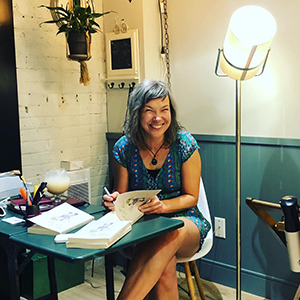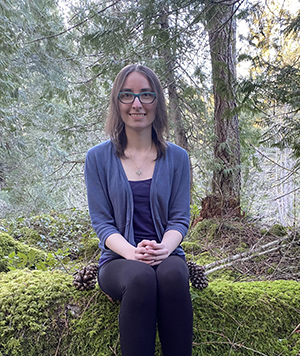Every Word Serves the Story: Colleen Bidner in Conversation with Susan Sanford Blades

Work Study student Colleen Bidner talks with Susan Sanford Blades, 2023's Far Horizons Award for Short Fiction judge.
Susan Sanford Blades lives on the traditional territory of the lək̓ʷəŋən speaking people; the Xwsepsum/Kosapsum and Songhees Nations (Victoria, BC). Her debut novel, Fake It So Real, won the 2021 ReLit Award in the novel category and was a finalist for the 2021 BC and Yukon Book Prizes Ethel Wilson Fiction Prize. Her short fiction has been anthologized in The Journey Prize Reader: The Best of Canada's New Writers and has been published in literary magazines across Canada as well as in the United States and Ireland. Her fiction has most recently been published in The Malahat Review and Gulf Coast.
What are three common tips you give to the emerging writers you mentor?
I think you can begin a story without really knowing where it’s going or what you’re doing with it, but there comes a point when you need to answer these simple questions: What does your main character want? Who or what is preventing your main character from getting what they want? What are the themes that drive this story? Once you’re clear on these three questions, you’ll be able to get into your story and make sure that every single word is working for the story (developing themes/character, furthering plot), and you’ll be able to come up with an ending that lands. Also, make sure your descriptions don’t only give us facts about something—they should tell us what something looks like (or feels/sounds/smells, etc.) from the character’s perspective, in the state they’re in. Aside from this, I tell them to not be afraid of revision or rejection. You’ll need to go through both in order to be published!
You were born on Treaty 6 territory, in Edmonton, and you currently live on the unceded territories of the Songhees and Esquimalt Nations (Victoria). Your bio says you're intrigued by the ocean and living in a cabin on Galiano Island. How does place affect your writing?
That’s a good question! I’d say generally, I focus so much on my characters’ interior states—what’s going on in their minds, their feelings about themselves and those around them—and I feel I ignore place in my writing more than I should. But I don’t think that’s completely true. I think I focus on place in the sense of how where we are affects us. Growing up in Edmonton, I had a far different upbringing than I would have had I grown up in Victoria. Having to wait for the bus for an hour in a pair of Converses caked in snow, the embarrassment of glasses fogging up upon entering school, having your heavily-sprayed pre-teen 80s bangs freeze in the winter—all of these things affect a character in a certain way and shape their story and who they are. Each city has its own personality too, and this rubs off on its inhabitants. Imagine the differing personalities of characters who grew up in a place coined Deadmonton, Hellberta as opposed to one who grew up on a highly coveted island. Those are the ways in which I’m interested in place.
Your debut novel, Fake It So Real, begins in the 1980s and moves into the next decade. Your novel-in-progress is set in the 90s. Both novels explore girls' and women's lives in daughterhood and motherhood. What draws you to write about these themes in this era?
I write in this era primarily because I came of age in the mid-90s and it’s what I know. Because Fake It So Real had coming-of-age elements to it and the novel I’m working on now is a coming-of-age story (the main character is 18 years old throughout), I felt I could only authentically write about a teenager in the era I’m familiar with being a teenager in. Being a teenager is like the best kind of secret club. I can try to decode my teenage sons, but I’d never truly get them and their culture enough to be able to properly write from the perspective of a Gen-Z teen. In my writing set in the 90s, people my age will connect with the dialect and the bands the characters are listening to, but I think, regardless of what era it’s set in, if a story is told authentically, teenage girls will connect with the universal experience of being a girl. I love that my sons’ female friends have read my book and connected with it. There’s also something I really love about writing about people before the era of cell phones and social media. There was a lot more time to reflect in isolation. There were moments of thoughtful boredom, when there literally was nothing to look at, nothing good on TV, no screen-based entertainment to summon on demand.
As for the themes, I write to explore the human condition, and I think we should all write about mothers if we want to truly explore the human condition. Our relationship with our mother informs every single relationship we have over the course of our lives. Ask a person what their relationship with their mother is like and their answer will tell you everything you need to know about them. The mother-daughter relationship is one that is particularly fraught. This is the best sort of conflict, because it involves love, shame, guilt, judgement, expectation. In the book I’m working on now, the main character is adopted and is trying to form a connection with her birth mother, while also navigating her relationship with her adoptive mother. It’s enabling me to explore the pressure we as a society put on mothers, the unreasonable expectations we have of them, and also the question of what makes someone a mother or a mothering figure.
How has your writing developed from when you did your Creative Writing MFA at the University of Victoria?
I think my writing itself kind of just continues to develop because I keep writing and everything improves with practice (I hope!). I think mostly what is developing since graduating is my ability to be an author, rather than only a writer. Having a book out in the world is a completely different experience from writing in relative isolation and having stories published in literary magazines that, let’s be honest, only other writers will read. It’s a whole new level of rejection and critique. The highs are higher and the lows are lower. I’ve realized that being an active participant in the writing community is a great way to get over my personal feelings about being an author. To support others feels so much better than wallowing in my own book’s lack of success (and it could just be me, but I think I will always feel like my books are not as successful as they should be). So, since graduating, I’ve created a life in which I have the flexibility to devote a significant amount of time to writing every day (though I’m not making a significant amount of money), I write a newsletter in which I celebrate other writers (Girls to the Front!), I’ve started reviewing books, and I’m hosting a reading series in Victoria every other month (The Community Salon Reading Series). I think being inspired by other writers’ books and by their experience as writers in this way has been the best thing for my writing life. Writing is a truly difficult thing to do, from getting over the dread of failure that washes over me every single day when I sit down to write (what if, just yesterday, I wrote my last good sentence?) to getting over my first one-star Goodreads review (“Boring and very pretentious”—oof). You have to truly want to do this in order to persevere and it’s way better to persevere together.
What techniques do you hope to see in a winning Far Horizons story? Do you have examples of these techniques in your short fiction?
The ideal story will make me consider what it means to be human in a new light. It will make me laugh, cry, gasp, and think. It will have a beating heart. Its characters will be flawed and honest (and if not honest, at least vulnerable). It will appeal to all the senses. Every single word will serve the story. Its ending will land—it will give me confidence the author knew exactly what the story needed before it left us. I also love snappy dialogue and a great simile.
Some examples:
Dialogue: I feel kind of strange giving examples from my own work, but I’ll use one because I do like this bit of dialogue from “Room and Board” in Fake It So Real. This is Nik, speaking to our protagonist, Sara, who has just left home in Victoria and landed at his place in Edmonton. Sara has just asked Nik where he works:
Sears. Men’s department.
Classy.
In West Edmonton Mall.
Is that good?
They have dolphins.
Like, in captivity?
No, no. Wild mall dolphins.
I don’t approve of that.
What, sarcasm?
Great simile: This is from Jasmine Sealy’s story “Collapse,” which was just published in the Journey Prize Stories: The Best of Canada’s New Black Writers (Vol. 33). “He understood Caroline, recognized the stubborn way she occupied a space, like a dandelion emerging again and again from the same crack in the pavement.”
Great imagery: This is from Sara Freeman’s novel Tides: “The only visible sign of life: a sliver of moon, butcher’s hook looking to grab at tender flesh. She is that sliver, she thinks, slim and threatening, glinting in the night.”
Looks into the human condition: Also from Sara Freeman’s Tides: “She should be angry, insulted even, but she sees it, coursing beneath Charlotte’s cruelty: her terror.”
And from Liz Harmer’s new novel, Strange Loops (which is full of these): “She knew nothing then of the accountability marriage entailed. Marriage surveilled and trapped people much more than parents did teenagers, but her teenage self felt no sympathy for Howie. He was an adult, and as far as she was concerned, utterly free. She did not understand that he was much more thoroughly chaperoned than she was.”
An ending that really landed and made me cry: From Dianah Smith’s story “The Promise of Foreign,” also from the recent Journey Prize anthology. This story is told from the point of view of a young Jamaican girl who has been raised by her aunt in Jamaica and has just met her birth mother, who had to leave the country after her birth. “‘Good morning, Miss Jemela,’ she say in a soft voice that sound like a younger Mama. She pull me ’gainst her and wrap her arms tight ’round my body. A sharp, flowery perfume tickle my nose. The buckle from her belt feel cold ’gainst my cheek. Her hands feel warm on my back. Is this what it like to have my own mama?”

Colleen Bidner
* * * * * * * *









